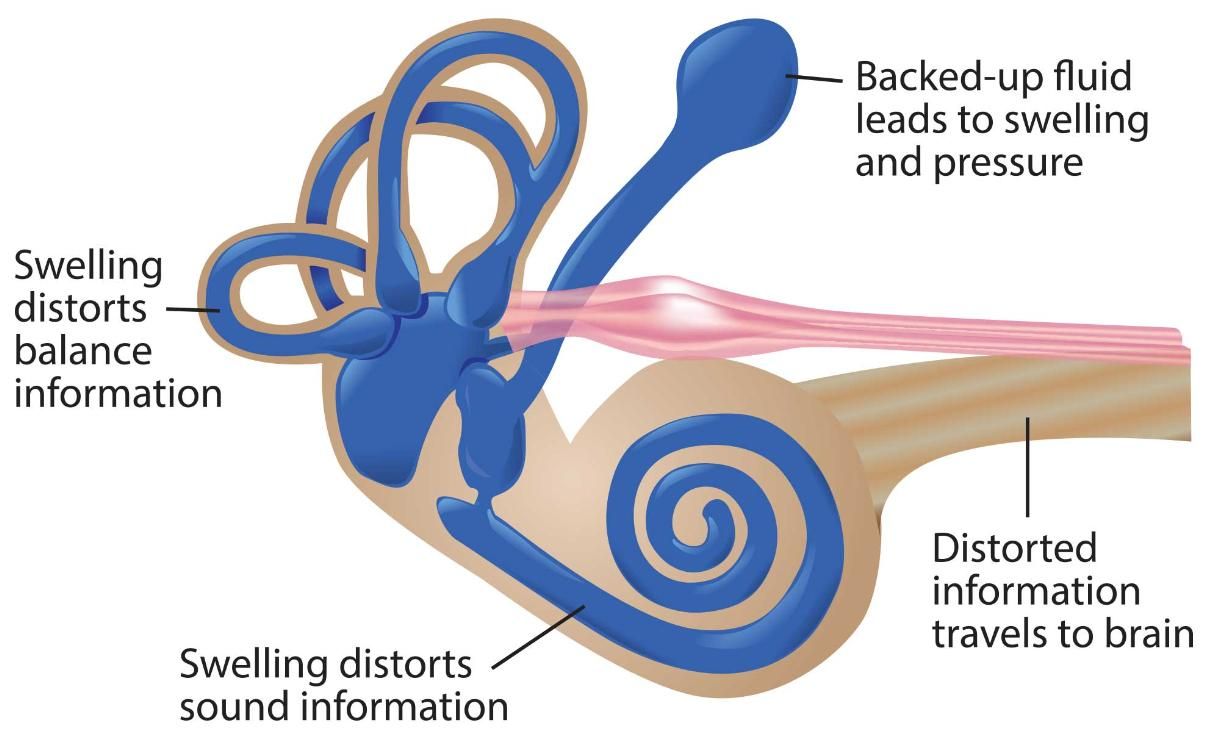Rehab Articles

Understanding Meniere's Disease
Meniere's disease is an inner ear disease that typically affects one ear. This disease can cause pressure or pain in the ear, severe cases of dizziness or vertigo, hearing loss and a ringing or roaring noise, also known as tinnitus. Although Meniere's disease can affect people of any age, people in their 40s and 50s are much more likely to experience it. This condition is considered to be chronic and there is no cure, but there are various treatment strategies that will minimize the effect on your life and relieve symptoms.
People with Meniere's will have sudden dizzy spells after experiencing tinnitus or muffled hearing. Symptoms vary from person to person, and some will experience many attacks over a period of several days, and others will have an isolated attack every once in awhile.
Potential Causes or Triggers
Although there is no exact cause of Meniere's, scientists believe that it has something to do with high pressure of the fluid in part of the inner ear. Passages and cavities connect throughout the inner ear, also called a labyrinth. The outside of the inner ear is a bone structure, while the interior is a soft membrane. This part of the ear contains tiny sensors that resemble hairs and respond to the movement of fluid, or endolymph, through the area. Potential causes or triggers of Meniere's disease include:
• Head injury
• Infection to the inner or middle ear
• Allergies
• Alcohol use
• Stress
• Side effects of certain medications
• Smoking
• Stress or anxiety
• Fatigue
• Family history of the disease
• Respiratory infection
• Recent viral illness
• Abnormal immune response
• Migraines
Symptoms
Meniere's disease varies dramatically from person to person, so people can experience an array of different symptoms that occur daily or just once a year.
Classic Symptoms: pressure in the ear, hearing loss, vertigo, tinnitus
Symptoms usually begin with the feeling of pressure in the ear, followed by tinnitus, hearing loss and vertigo. These episodes will last anywhere from 20 minutes to four hours. People with Meniere's will generally experience episodes in clusters with long periods of remission. When you experience an episode of Meniere's disease, it is best to lie down and focus on one sole, non-moving object. Often times, a sufferer will feel better after taking a nap.
Stages of Meniere's Disease and Diagnosis
Meniere's disease commonly affects people in various stages, with symptoms developing over time.
• Early state: During this time, a person will experience sudden and often out-of-the-blue episodes of vertigo that last anywhere from 20 minutes to an entire day. An individual's ear may feel blocked or full, and they may have some hearing loss, which typically goes away after the episode fades. It is also common to feel the effects of tinnitus.
• Middle stage: Symptoms of vertigo tend to become less severe during this stage, while hearing loss and tinnitus will increase in severity. Many people will also experience long-term remission that can last several months.
• Late stage: During the late stages of Meniere's disease, patients will not suffer from vertigo as often, and some people will be relieved from it forever. However, tinnitus and hearing loss will likely get progressively worse, and people will likely experience unsteady balance regularly. Most people feel unstable in dark conditions when bearings are off.
Along with the common symptoms of Meniere's disease, it's possible to suffer from depression or anxiety. Since the ailment affects hearing, you may lose the confidence to have conversations with others or at work, which can contribute to depression or anxiety. In addition, symptoms tend to pop up out of nowhere, so those living with Meniere's can live in a constant anxious state unsure of when an episode will occur.
To diagnose the disease, you must experience tinnitus, hearing loss and vertigo more than once. Since all of these issues can stand alone or be associated with other diseases, Meniere's can sometimes be difficult to diagnose.
Treatment Options
Since Meniere's disease is not curable, many treatment options involve patients changing their habits or diet, or taking medications. Dietary changes can decrease the amount of fluid in the inner ear, which can weaken the symptoms of the disease. These changes include:
• Salt intake: Salt helps the body to retain water, so reduce intake of sodium-rich beverages and foods.
• Decrease caffeine: Caffeinated beverages can make symptoms like tinnitus worse, so it is best to decrease the amount of this stimulant in your diet.
• Monosodium glutamate (MSG): Although many food manufacturers have begun to avoid using MSG because of its harmful properties, it is still important to check labels to make sure it is not added.
• Smaller meals: More experts are proving there are greater benefits to the body if you consume five to six smaller meals throughout the day instead of three larger meals. This dietary pattern can also improve symptoms of Meniere's disease by keeping the metabolism moving and bodily fluids regulated. Similarly, opting for a healthier lifestyle can decrease the amount and severity of Meniere's disease symptoms.
• Smoking: Many people who suffer from Meniere's disease and who regularly smoke report weakened symptoms after quitting.
• Stress management: Stress and anxiety are both linked to Meniere's disease, but both can be a cause and symptom of the disease. Learning how to manage and identify stressors can bring relief. It may be beneficial to try relaxation or meditation techniques.
Contributed by Mandy Mroz, AuD, director, Healthy Hearing
